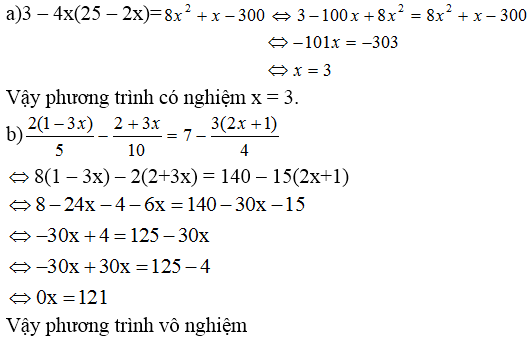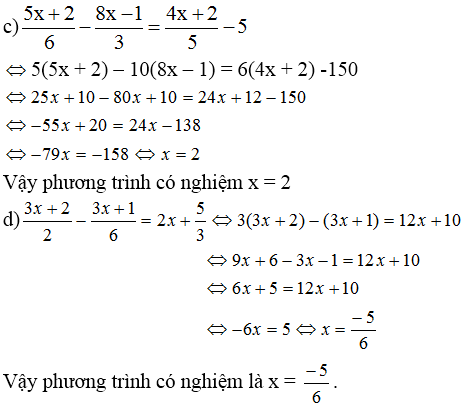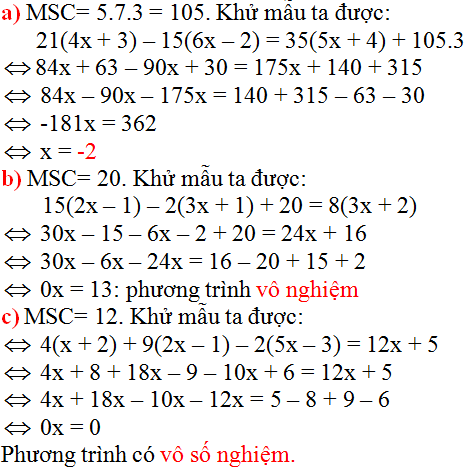Hãy nhập câu hỏi của bạn vào đây, nếu là tài khoản VIP, bạn sẽ được ưu tiên trả lời.

giải pt sau
g) 11+8x-3=5x-3+x
\(\Leftrightarrow\) 8x + 8 = 6x - 3
<=> 8x-6x = -3 - 8
<=> 2x = -11
=> x=-\(\dfrac{11}{2}\)
Vậy tập nghiệm của PT là : S={\(-\dfrac{11}{2}\)}
h)4-2x+15=9x+4-2x
<=> 19 - 2x = 7x + 4
<=> -2x - 7x = 4 - 19
<=> -9x = -15
=> x=\(\dfrac{15}{9}=\dfrac{5}{3}\)
Vậy tập nghiệm của pt là : S={\(\dfrac{5}{3}\)}
g)\(\dfrac{3x+2}{2}-\dfrac{3x+1}{6}=\dfrac{5}{3}+2x\)
<=> \(\dfrac{3\left(3x+2\right)}{6}-\dfrac{3x+1}{6}=\dfrac{5.2+6.2x}{6}\)
<=> 9x + 6 - 3x + 1 = 10 + 12x
<=> 6x + 7 = 10 + 12x
<=> 6x -12x = 10-7
<=> -6x = 3
=> x= \(-\dfrac{1}{2}\)
Vậy tập nghiệm của PT là : S={\(-\dfrac{1}{2}\)}
\(h,\dfrac{x+4}{5}-x+4=\dfrac{4x+2}{5}-5\)
<=> \(\dfrac{x+4-5\left(x+4\right)}{5}=\dfrac{4x+2-5.5}{5}\)
<=> x + 4 - 5x - 20 = 4x + 2 - 25
<=> x - 5x - 4x = 2-25-4+20
<=> -8x = -7
=> x= \(\dfrac{7}{8}\)
Vậy tập nghiệm của PT là S={\(\dfrac{7}{8}\)}
\(i,\dfrac{4x+3}{5}-\dfrac{6x-2}{7}=\dfrac{5x+4}{3}+3\)
<=> \(\dfrac{21\left(4x+3\right)}{105}\)-\(\dfrac{15\left(6x-2\right)}{105}\)=\(\dfrac{35\left(5x+4\right)+3.105}{105}\)
<=> 84x + 63 - 90x + 30 = 175x + 140 + 315
<=> 84x - 90x - 175x = 140 + 315 - 63 - 30
<=> -181x = 362
=> x = -2
Vậy tập nghiệm của PT là : S={-2}
K) \(\dfrac{5x+2}{6}-\dfrac{8x-1}{3}=\dfrac{4x+2}{5}-5\)
<=> \(\dfrac{5\left(5x+2\right)}{30}-\dfrac{10\left(8x-1\right)}{30}=\dfrac{6\left(4x+2\right)-150}{30}\)
<=> 25x + 10 - 80x - 10 = 24x + 12 - 150
<=> -55x = 24x - 138
<=> -55x - 24x = -138
=> -79x = -138
=> x=\(\dfrac{138}{79}\)
Vậy tập nghiệm của PT là S={\(\dfrac{138}{79}\)}
m) \(\dfrac{2x-1}{5}-\dfrac{x-2}{3}=\dfrac{x+7}{15}\)
<=> \(\dfrac{3\left(2x-1\right)-5\left(x-2\right)}{15}=\dfrac{x+7}{15}\)
<=> 6x - 3 - 5x + 10 = x+7
<=> x + 7 = x+7
<=> 0x = 0
=> PT vô nghiệm
Vậy S=\(\varnothing\)
n)\(\dfrac{1}{4}\left(x+3\right)=3-\dfrac{1}{2}\left(x+1\right)-\dfrac{1}{3}\left(x+2\right)\)
<=> \(\dfrac{1}{4}x+\dfrac{3}{4}=3-\dfrac{1}{2}x-\dfrac{1}{2}-\dfrac{1}{3}x-\dfrac{2}{3}\)
<=> \(\dfrac{1}{4}x+\dfrac{1}{2}x+\dfrac{1}{3}x=3-\dfrac{1}{2}-\dfrac{2}{3}-\dfrac{3}{4}\)
<=> \(\dfrac{13}{12}x=\dfrac{13}{12}\)
=> x= 1
Vậy S={1}
p) \(\dfrac{x}{3}-\dfrac{2x+1}{6}=\dfrac{x}{6}-6\)
<=> \(\dfrac{2x-2x+1}{6}=\dfrac{x-36}{6}\)
<=> 2x -2x + 1= x-36
<=> 2x-2x-x = -37
=> x = 37
Vậy S={37}
q) \(\dfrac{2+x}{5}-0,5x=\dfrac{1-2x}{4}+0,25\)
<=> \(\dfrac{4\left(2+x\right)-20.0,5x}{20}=\dfrac{5\left(1-2x\right)+20.0,25}{20}\)
<=> 8 + 4x - 10x = 5 - 10x + 5
<=> 4x-10x + 10x = 5+5-8
<=> 4x = 2
=> x= \(\dfrac{1}{2}\)
Vậy S={\(\dfrac{1}{2}\)}
g) \(11+8x-3=5x-3+x\)
\(\Leftrightarrow8+8x=6x-3\)
\(\Leftrightarrow8x-6x=-3-8\)
\(\Leftrightarrow2x=-11\)
\(\Leftrightarrow x=-\dfrac{11}{2}\)
h, \(4-2x+15=9x+4-2x\)
\(\Leftrightarrow-2x-9x+2x=4-4-15\)
\(\Leftrightarrow-9x=-15\)
\(\Leftrightarrow x=\dfrac{-15}{-9}=\dfrac{5}{3}\)

bài này đề bài là chứng minh hay là giải bất phương trình vậy bạn

a: =>5-x+6=12-8x
=>-x+11=12-8x
=>7x=1
hay x=1/7
b: \(\dfrac{3x+2}{2}-\dfrac{3x+1}{6}=2x+\dfrac{5}{3}\)
\(\Leftrightarrow9x+6-3x-1=12x+10\)
=>12x+10=6x+5
=>6x=-5
hay x=-5/6
d: =>(x-2)(x-3)=0
=>x=2 hoặc x=3

24:
\(\Leftrightarrow\dfrac{1}{\left(x+2\right)\left(x+3\right)}+\dfrac{1}{\left(x+3\right)\left(x+4\right)}+\dfrac{1}{\left(x+4\right)\left(x+5\right)}+\dfrac{1}{\left(x+5\right)\left(x+6\right)}=\dfrac{1}{8}\)
\(\Leftrightarrow\dfrac{1}{x+2}-\dfrac{1}{x+6}=\dfrac{1}{8}\)
\(\Leftrightarrow\left(x+2\right)\left(x+6\right)=8\left(x+6\right)-8\left(x+2\right)\)
\(\Leftrightarrow x^2+8x+12=8x+48-8x-16=32\)
=>(x+10)(x-2)=0
=>x=-10 hoặc x=2
25: \(\Leftrightarrow\dfrac{\left(x+1\right)^2+1}{x+1}+\dfrac{\left(x+4\right)^2+4}{x+4}=\dfrac{\left(x+2\right)^2+2}{x+2}+\dfrac{\left(x+3\right)^2+3}{x+3}\)
\(\Leftrightarrow x+1+\dfrac{1}{x+1}+x+4+\dfrac{4}{x+4}=x+2+\dfrac{2}{x+2}+x+3+\dfrac{3}{x+3}\)
\(\Leftrightarrow\dfrac{1}{x+1}+\dfrac{4}{x+4}=\dfrac{2}{x+2}+\dfrac{3}{x+3}\)
\(\Leftrightarrow x+5=0\)
hay x=-5

a, Ta có : \(\dfrac{2x-1}{5}-\dfrac{x-2}{3}=\dfrac{x+7}{15}\)
=> \(\dfrac{3\left(2x-1\right)-5\left(x-2\right)}{15}=\dfrac{x+7}{15}\)
=> \(\dfrac{6x-3-5x+10}{15}=\dfrac{x+7}{15}\)
=>\(\dfrac{x+7}{15}=\dfrac{x+7}{15}\)
Vậy phương trình thỏa mãn với mọi x
b, Ta có :\(\dfrac{5x+2}{6}-\dfrac{8x-1}{3}=\dfrac{4x+2}{5}-5\)
=>\(\dfrac{5x+2-2\left(8x+1\right)}{6}=\dfrac{4x+2-25}{5}\)
=>\(\dfrac{5x+2-16x+2}{6}=\dfrac{4x-23}{5}\)
=>\(\dfrac{-11x+4}{6}=\dfrac{4x-23}{5}\)
=> 6(4x-23)= 5(-11x+4) => 24x-138=-55x+20 => 79x =158 =x=2
Vậy x=2





Lời giải:
a)
\(x^4+2x^3+5x^2+4x-12=0\)
\(\Leftrightarrow x^3(x-1)+3x^2(x-1)+8x(x-1)+12(x-1)=0\)
\(\Leftrightarrow (x-1)(x^3+3x^2+8x+12)=0\)
\(\Leftrightarrow (x-1)[x^2(x+2)+x(x+2)+6(x+2)]=0\)
\(\Leftrightarrow (x-1)(x+2)(x^2+x+6)=0\)
\(\Leftrightarrow\left[{}\begin{matrix}x=1\\x=-2\\x^2+x+6=0\left(1\right)\end{matrix}\right.\)
Đối với (1): \(\Leftrightarrow (x+\frac{1}{2})^2+\frac{23}{4}=0\)
(vô lý vì \((x+\frac{1}{2})^2+\frac{23}{4}\geq \frac{23}{4}>0\) )
Do đó \(x\in\left\{-2;1\right\}\)
b) ĐKXĐ: ......
\(\frac{1}{x^2+4x+3}+\frac{1}{x^2+8x+15}=\frac{1}{6}\)
\(\Leftrightarrow \frac{1}{(x+1)(x+3)}+\frac{1}{(x+3)(x+5)}=\frac{1}{6}\)
\(\Leftrightarrow \frac{(x+5)+(x+1)}{(x+1)(x+3)(x+5)}=\frac{1}{6}\)
\(\Leftrightarrow \frac{2(x+3)}{(x+1)(x+3)(x+5)}=\frac{1}{6}\Leftrightarrow \frac{2}{(x+1)(x+5)}=\frac{1}{6}\)
\(\Leftrightarrow (x+1)(x+5)=12\)
\(\Leftrightarrow x^2+6x-7=0\)
\(\Leftrightarrow (x-1)(x+7)=0\)
\(\Leftrightarrow\left[{}\begin{matrix}x=1\\x=-7\end{matrix}\right.\) (thỏa mãn đkxđ)
Vậy \(x\in\left\{-7;1\right\}\)